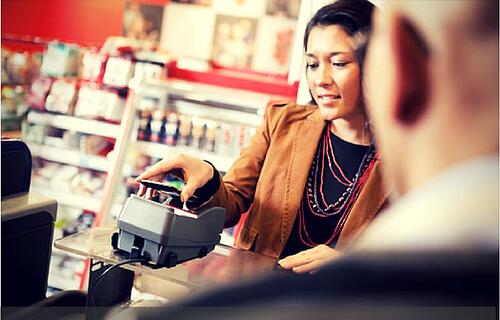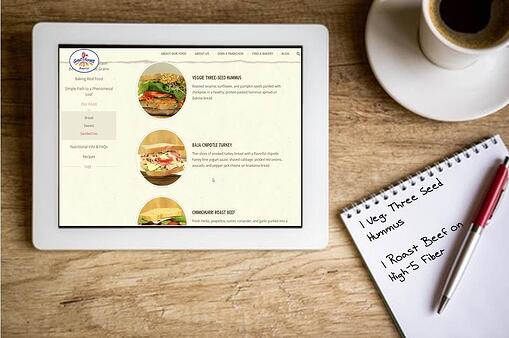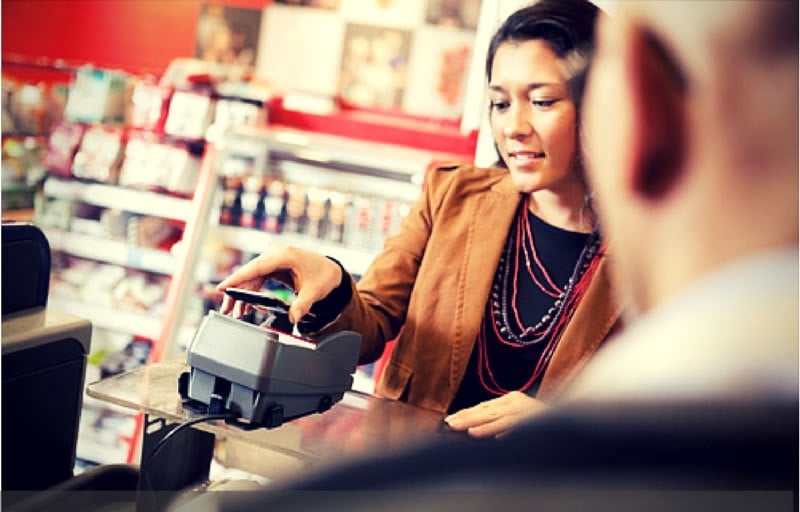I expect so. This morning while in the checkout line I saw my first checkout terminal with Apple Pay. There it was, along with the standard options of debit and credit: Apple Pay. It is here. I asked the cashier if she had seen anyone use it and she said once. Her response was it looked pretty futuristic with a thumbprint and all of that. Okay.
 The concept of a virtual wallet has been here for a while but hasn’t really taken hold in the U.S. in a mass market way. Just as the concept of easy, portable music was around for a while before the iPod came into being. The idea of a tablet was around long before 2010 when the iPad was launched. (By the way, it is hard to believe that product is only four years old…)
The concept of a virtual wallet has been here for a while but hasn’t really taken hold in the U.S. in a mass market way. Just as the concept of easy, portable music was around for a while before the iPod came into being. The idea of a tablet was around long before 2010 when the iPad was launched. (By the way, it is hard to believe that product is only four years old…)
But, Apple Pay will change the world. Not as quickly as the other "i devices" did, because you have to have a combination of a customer with an iPhone 6 who is set up to use it and a merchant that is set up to accept it. That feels like a pretty small market to me, but I can see how —once the right credit cards and merchants get set up on it— that the availability of Apple Pay could influence my choice of stores. If I carry one less thing and have one more way to manage my cash flow then I will do it.
Apple Pay Offers Compelling Benefits For Consumers, Including:
- Potentially increased security and privacy (cashiers don't see data; no card information is shared with the merchant).
- Simpler to use than credit cards or other mobile shopping apps. Apple Pay doesn't require a password login to unlock your device or open an app. Once your cards are connected to your iPhone 6 or 6 Plus, you can pay with a simple fingerprint. (Apple has a demo video of it here). There are fewer steps — no change, no credit card signature, no cashier interaction.
Why Small Businesses Should Consider Apple Pay
Apple Pay will appeal to consumers — starting with Apple devotees who generally make and spend more than Android users do, according to multiple studies (WashingtonPost.com). For small businesses, this means that accepting mobile payments could provide a competitive advantage. Or, perhaps more accurately, those who fail to adopt the payment methods their customers prefer to use risk being left behind. Even before being announced, Apple Pay had secured buy-in from over 22,000 retailers and the issuers who control 83% of U.S.-based credit card transactions (Apple's press release).
A key point for interested business owners is that their payment terminals must support near-field communication (NFC) which is the wireless signal that allows Apple Pay to work. Unrelated to Apple Pay, all merchants must upgrade their payment systems by October 2015 to support credit cards with EMV chips, or risk increased liability in the event of a security breach. Only about 20% of merchants have made this upgrade so far (Javelin Strategy & Research, in BusinessWeek.com).
Since most EMV-enabled payment terminals can also handle NFC transactions, the impending upgrade will allow most of these merchants to also accept Apple Pay (Entrepreneur.com). Industry analysts like David Fandetti of Citi Research (in Fortune.com) believe that "Apple Pay will accelerate the timeline for mobile payment [and POS terminal upgrades]."
When you take all that into consideration, in the next twelve months we can expect to see a rapid adoption of Apple Pay and easier, faster checkout lines. It may be longer before most consumers have the right devices and comfort level to use Apple Pay, but most major stores should be able to accommodate it in the near future. Rapid growth of opting to pay by mobile is not far behind. Yet again, Apple is not the first, but the best, and will open the gate to mass adoption of something that changes the landscape — in this case, retail transactions.
 Back to the iPad. What do you think is next for it? I can see it becoming more of a business tool and less of a consumer product. As phones get bigger and laptops get smaller, the tablet will get squeezed. But, ironically, I can see it thriving for years to come in the food business on the retailer's side of the checkout. It is safe to use around food (it isn’t subject to moisture issues like a laptop) and most small businesses are moving to iPad-based POS Systems. I can’t see a phone or smaller laptop taking over those roles. I can’t think of anyone who predicted the iPad would carve out a business-to-business niche like that. But that may just be its future.
Back to the iPad. What do you think is next for it? I can see it becoming more of a business tool and less of a consumer product. As phones get bigger and laptops get smaller, the tablet will get squeezed. But, ironically, I can see it thriving for years to come in the food business on the retailer's side of the checkout. It is safe to use around food (it isn’t subject to moisture issues like a laptop) and most small businesses are moving to iPad-based POS Systems. I can’t see a phone or smaller laptop taking over those roles. I can’t think of anyone who predicted the iPad would carve out a business-to-business niche like that. But that may just be its future.
Last fall, Forbes.com cited an Aruba Networks study that found a whooping 56% of businesses were planning to implement mobile technology systems via iPad. And a more recent Biztechmagazine.com article cited Forrester research which found 43% of companies were already using iPads for their POS systems— more than any other device. So perhaps Apple has already succeeded in changing the world by changing the checkout lane, with less fanfare and attention than has been given to the Apple Watch and Apple Pay.
Some of the business advantages of iPad-based POS systems listed in the Forbes article include improved time management and better inventory control. Other advantages are lower costs and faster transactions, compared to other POS systems. This makes them a great option for the retail and food industries where they've enjoyed high rates of adoption.
Have you used Apple Pay in the checkout line yet? Do you use a iPad-based POS in your business? We'd love to know what you think.
You may be interested in some of our other small business blog posts:
- Back to Basics in Your Local Retail Business
- Resolve to Make Your Retail Business the Best it Can Be in 2014
- Does Your Small Business Know How to Do 360° Reviews?





